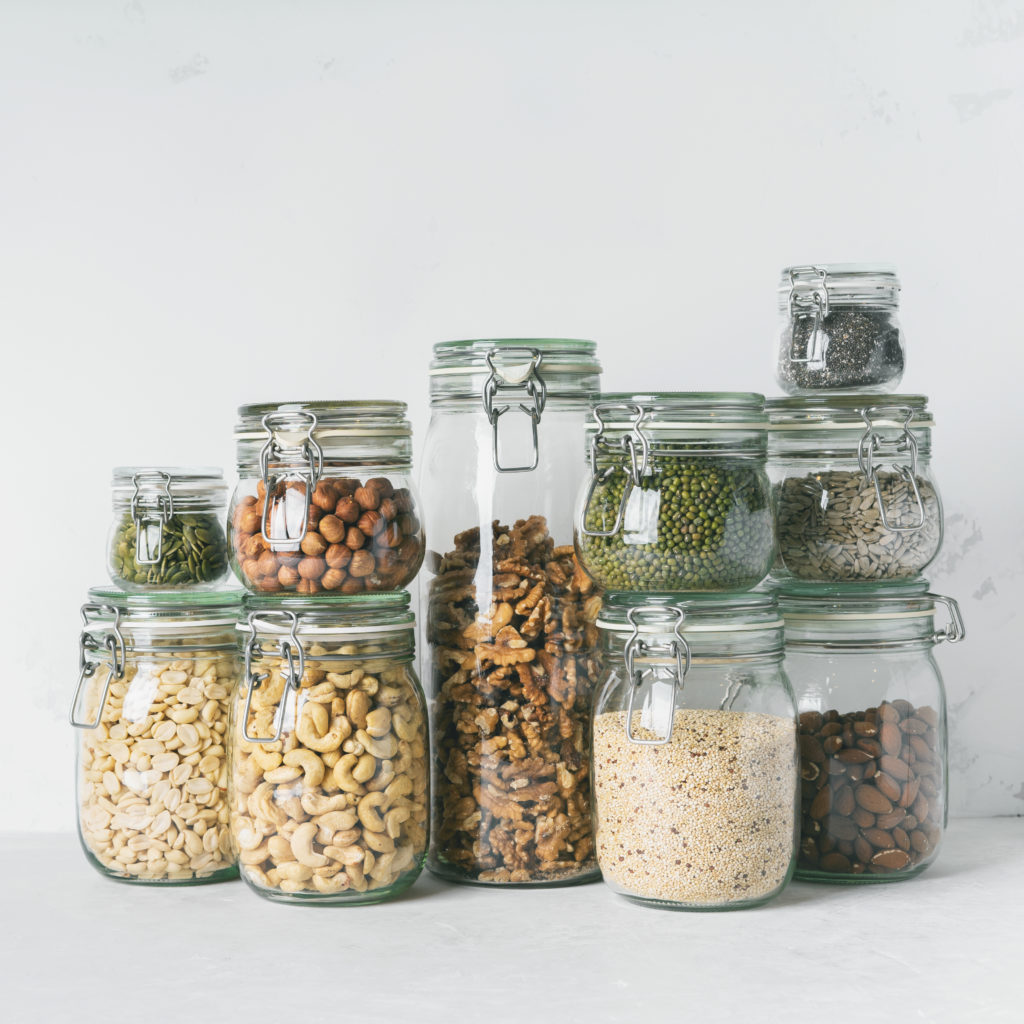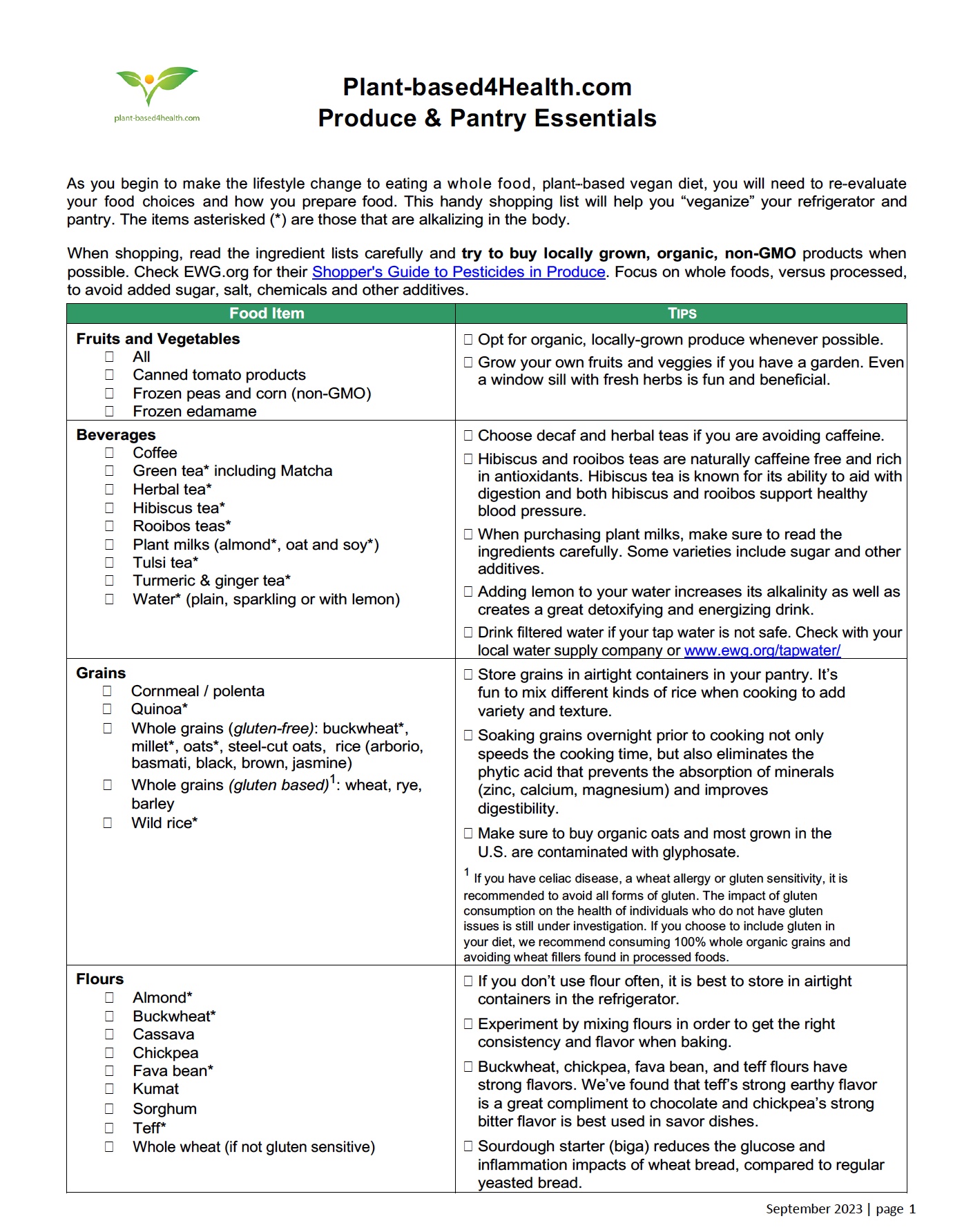Setting Up Your Pantry & Refrigerator
As you begin to make the lifestyle change to eating a plant-based vegan diet, you will need to re-evaluate your food choices and how you prepare food. To begin, you’ll want to take some time to “veganize” your pantry and refrigerator. The following steps are designed to help guide you. If you or a loved one is healing from cancer, view our low-glycemic, alkalizing diet recommendations.
Step 1: Out With the Old
The first step to get rid of all the products you no longer want to be using. Here’s what we recommend throwing out:
- Outdated food
- Prepackaged foods that contain chemical ingredients or ingredients you need a dictionary to understand what they are
- Canned or prepackaged foods that contain corn syrup, high fructose corn syrup, fructose (unless it states the product is certified organic or nonGMO)
- Refined sugars (white and brown sugar)
- Non-organic oats may be tainted with the likely carginogenic pesticide, glyphosate.
Download our handy shopping list.
Step 2: In With the New
You’ll want to fill your pantry and refrigerator with staple foods ready to use when needed. When refilling your pantry, it is important to read the labels carefully to ensure they are free of chemical additives and that the ingredients are all natural. The basic rule of thumb on ingredient lists is, if you don’t know what it is or can’t pronounce it, don’t eat it.
When shopping, try to buy locally grown organic produce when possible. You might want to investigate your local natural health foods stores or produce stands. Allow yourself extra time in the store so you don’t feel rushed.
Below is a list of suggested items that we always keep on hand. You may want to begin by focusing on the items you prefer to use or would like to try to incorporate into your cooking. The items asterisked (*) are those that are also alkalizing in the body. In addition, we invite you to view and download our Whole Food, Plant-based Produce & Pantry Essentials shopping list.
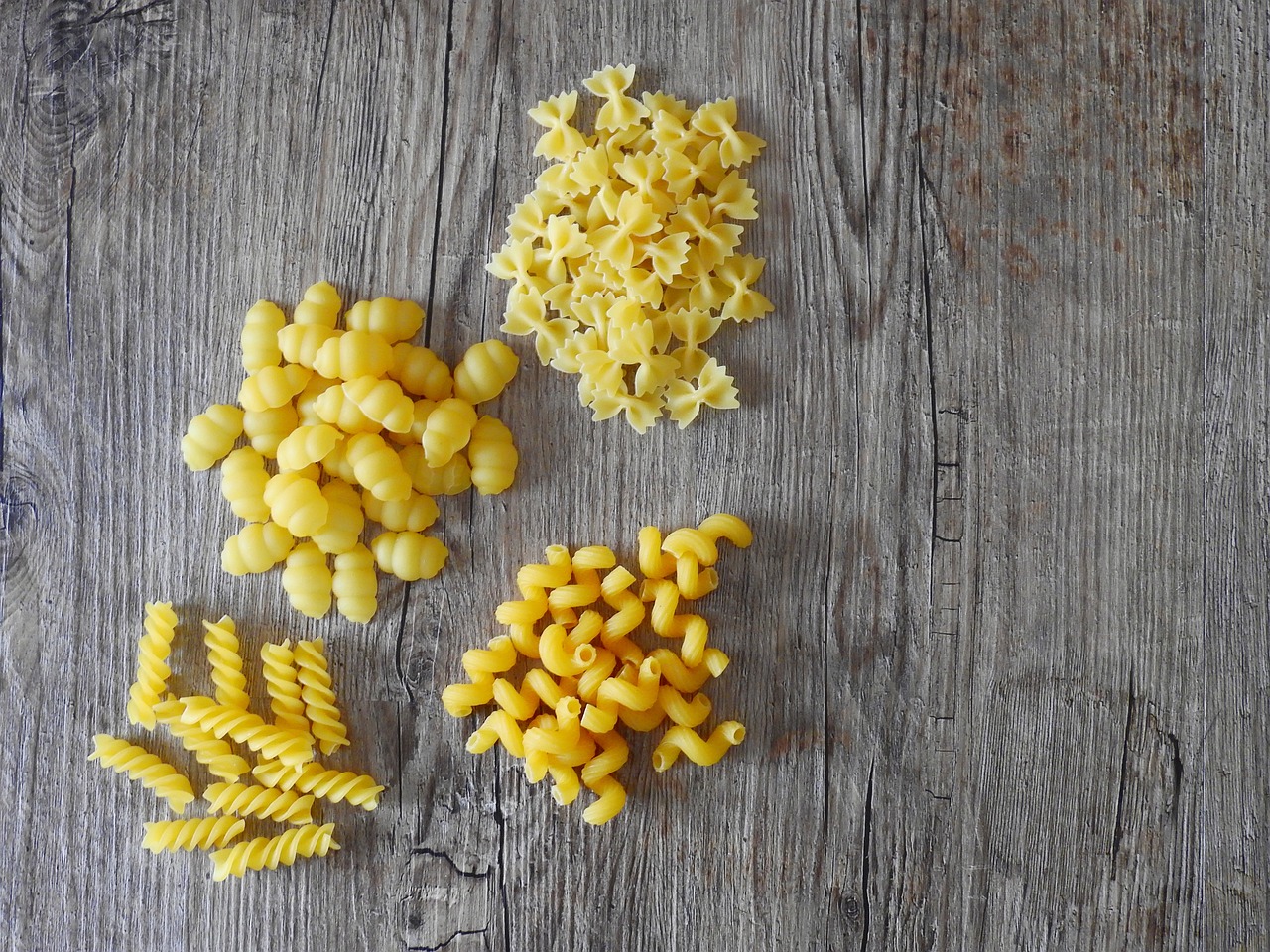
Pantry & Refrigerator Essentials
The items asterisked (*) are alkalizing in the body.
- Load up on all fruits and vegetables
- Canned tomato products
- Frozen edamame, peas and corn
Tips:
- Opt for oganic, locally-grown produe whenever possible.
- Grow your own fruits and vegetables if you have a garden. Even a window sill with fresh herbs is fun and beneficial.
Beverages
- Water* (plain or with lemon)
- Plant milks (almond*, organic oat and soy*)
- Tea
-
- Coffee
- Green tea* including Matcha
- Herbal tea*
- Hibiscus tea*
- Rooibos teas
- Plant milks (almond, oat and soy*)
- Tulsi tea*
- Turmeric & ginger tea*
- Water* (plain, sparkling or with lemon)
-
Tips:
- Choose decaf and herbal teas if you are avoiding caffeine.
- Hibiscus and rooibos teas are naturally caffeine free and rich in antioxidants. Hibiscus tea is known for its ability to aid with digestion and both Hibiscus and rooibos support healthy blood pressure.
- When purchasing plant milks, make sure to read the ingredients carefully. Some varieties include sugar and other additives.
- Adding lemon to your water increases its alkalinity as well as creates a great detoxifying and energizing drink.
- Drink filtered water if your tap water is not safe. Check with your local water supply company or www.ewg.org/tapwater/
Grains
- Barley (if not gluten-free)
- Buckwheat*
- Corn meal / polenta
- Millet*
- Oats* – organic (old-fashioned and steel cut)
- Quinoa*
- Rice (arborio, basmati, black, brown, jasmine)
- Rye (not gluten-free)
- 100% Whole Stone Ground Organic Wheat (not gluten-free)
- Wild rice*
Tips:
- Store grains in airtight containers in your pantry. It’s fun to mix different kinds of rice when cooking to add variety and texture.
- Soaking grains overnight prior to cooking not only speeds the cooking time, but also eliminates the phytic acid that prevents the absorption of minerals (zinc, calcium, magnesium) and improves digestibility.
- Make sure to buy organic oats and most grown in the U.S. are contaminated with glyphosate.
1 If you have celiac disease, a wheat allergy or gluten sensitivity, it is recommended to avoid all forms of gluten. The impact of gluten consumption on the health of individuals who do not have gluten issues is still under investigation. If you choose to include gluten in your diet, we recommend consuming 100% whole organic grains and avoiding wheat fillers found in processed foods.
Flour
- Almond*
- Buckwheat*
- Cassava
- Chickpea
- Fava bean*
- Kumat
- Oat*
- Sorghum*
- Teff*
Tips:
- If you don’t use flour often, it is best to store in airtight containers in the refrigerator.
- Experiment by mixing flours in order to get the right consistency and flavor when baking.
- Buckwheat, chickpea, fava bean, and teff flours have strong flavors. We’ve found that teff’s strong earthy flavor is a great compliment to chocolate and chickpea’s strong bitter flavor is best used in savor dishes.
Pasta
- Chickpea
- Mung bean
- Quinoa-brown rice pasta
- Red lentil*
- Wheat (if not gluten sensitive)
Tips:
- Be careful when shopping as some pastas are made with egg.
- Chickpea pasta is a firm pasta that works great in soups and stews as it won’t turn gummy or mushy.
- Quinoa-brown rice and mung bean pastas have a mild taste and mimics standard gluten-based pasta.
- Red lentil pasta is best eaten the same day it’s cooked as it tends to dry out quickly when stored in the fridge.
Legumes
- Beans (black, pinto, kidney, red)
- Black-eyed peas
- Chickpeas/garbanzo beans*
- Lentils* (black, green, French (mini), red)
- Mung dal
- Split peas*
Hints:
- Beans are very acidic. Soaking beans overnight in a strong concentration of lemon or lime water helps to lower their acidity and make them easier to digest.
- Also, to de-‐gas the beans, begin cooking by bringing to a fast boil for 10 minutes then turn off heat and let sit for 5-‐10 minutes. Rinse beans well before refilling the pot with water and continue cooking as usual. You can also add a bit of dried seaweed to the beans while cooking to improve digestibility.
Nuts (opt for organic, raw)
- Almonds*
- Brazil
- Cashews
- Pecans
- Pistachios
- Walnuts
Tips:
- Nuts are cheaper to purchase in bulk.
- Storing nuts in the freezer will extend their life.
Seeds
- Chia*
- Flax*
- Hemp*
- Pumpkin* (raw)
- Sesame*
- Sunflower* (raw and roasted)
Tips:
- Chia and flax seeds are great substitutes for eggs when baking.
- Seeds can be cheaper to purchase in bulk.
- Storing seeds in the freezer will extend their life, especially flax.
Herbs
- Basil*
- Cilantro*
- Dill*
- Mint*
- Oregano*
- Parsley*
- Rosemary*
- Sage*
- Stevia*
- Thyme*
Tips:
- If possible, grow your own fresh, organic herbs.
Seasonings
- Garlic* (fresh and granular)
- Nutritional yeast
- Raw cocoa powder
- Salt (sea salt and some with iodine)
- Tamari, soy sauce, and/or Braggs amino acids
- Various spices such as cumin* and chili powder, curry, etc.
Tips:
- Fill your spice cabinet with the flavors you enjoy tasting.
- The spices we use more often are: basil, oregano, cumin, chili powder, garlic, curry, turmeric, saffron, cayenne pepper.
Oils/Vinegars
- Apple cider vinegar*
- Avocado oil*
- Balsamic vinegar
- Coconut oil* (cold pressed)
- Flaxseed oil*
- Grapeseed oil
- Hemp oil*
- Olive oil*
- Rice vinegar (unseasoned)
- Walnut oil
Tips:
- When purchasing vinegars, watch out for vinegars that have caramel coloring added.
- Store flaxseed and hemp oil in the refrigerator.
- For high heat frying, use coconut oil since it has a high flash point.
Sweeteners
- Date paste* (see recipe below)
- Raw honey* (local if possible)
- Pure maple syrup
- Raw agave syrup
- Raw coconut sugar*
- Stevia leaf * (ground)
Tips:
- Avoid using white processed sugar (i.e. cane sugar and brown sugar).
- To make date paste, in a small bowl add 1 cup of dates and 1/4 cup of water. Let sit for 15 min then put in blender or food processor. Blend until smooth. Store in airtight container in fridge for up to 2 weeks.
- When purchasing honey, opt for local, raw and make sure to read the ingredients carefully as some brands include caramel coloring or other additives.
Prepackaged foods
- Almond butter*
- Baking Powder (aluminum-free and non-GMO if made with cornstarch)
- Baking Soda (aluminum-free)
- Canned beans (preferably cook your own)
- Dark chocolate
- Dates*
- Miso paste
- Raisins
- Shredded coconut*
- Seaweed* (dulse, nori, kelp, etc.)
- Stewed tomatoes
- Tahini*
- Tomatoes (stewed, diced and paste)
- Vegetable broth
Hints:
- Avoid prepackaged foods with added sugar and preservatives.
- When purchasing dark chocolate, read the ingredients carefully as many brands include milk and refined sugars. We enjoy eating Theo’s 85% dark chocolate and Alter Eco’s 95% dark chocolate mint.
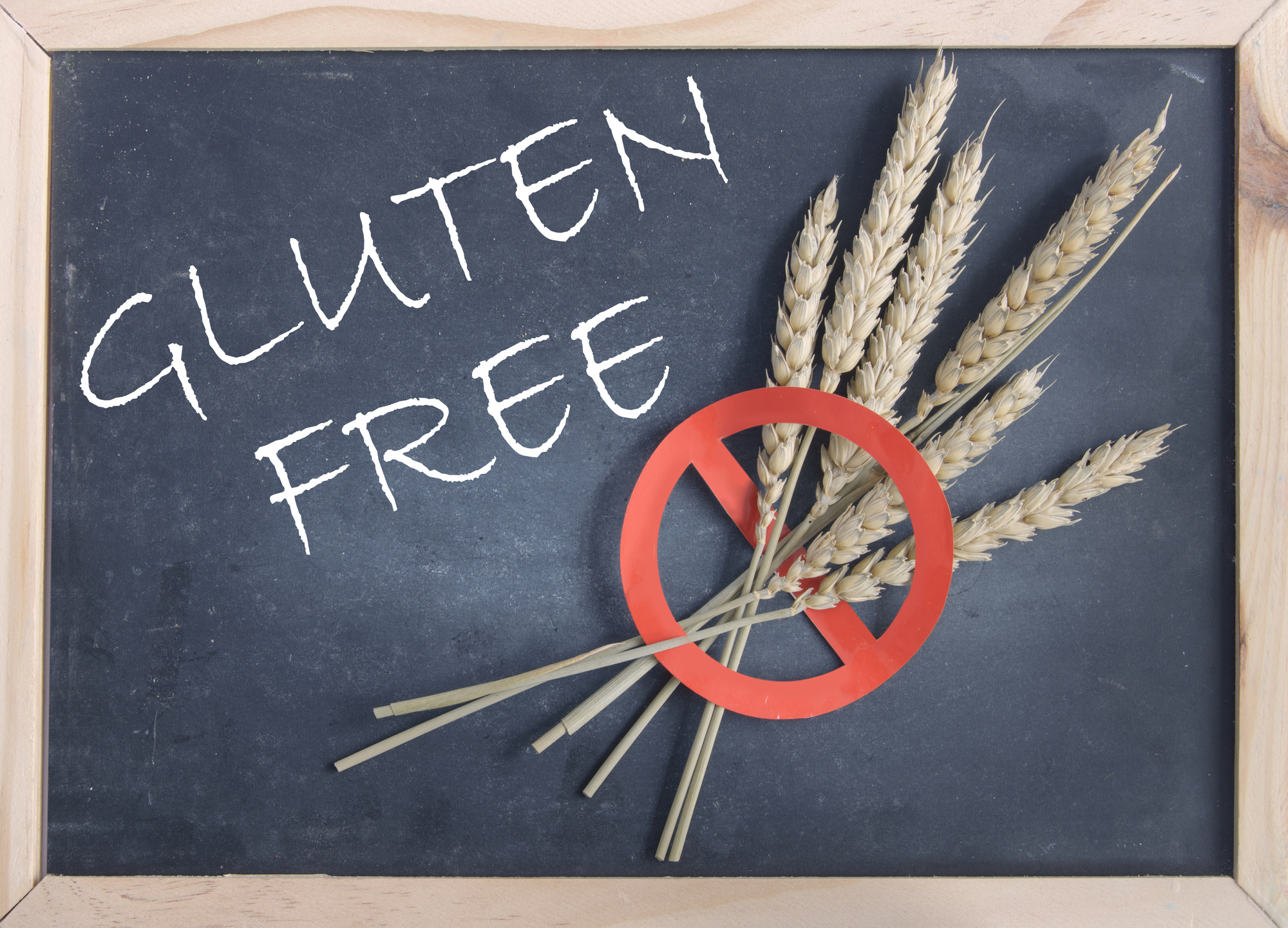
A Note About Gluten
If you have celiac’s disease, a wheat allergy or gluten sensitivity, it is recommended to avoid all forms of wheat. The impact of wheat consumption on the health of individuals who do not have gluten issues is still under investigation.
If you choose to include wheat in your diet, we recommend consuming 100% whole stone ground organic wheat and avoiding wheat fillers found in processed foods.
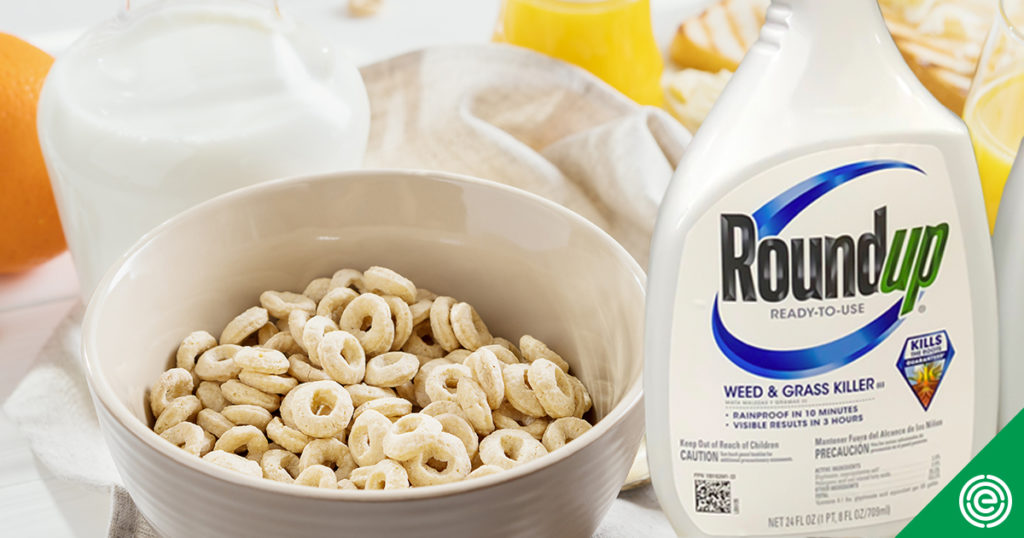
Choose Organic!
According to the Environmental Working Group, “In its latest report on glyphosate residues on common children’s foods, EWG found that, like oats and wheat, chickpeas and other beans and lentils come with a dose of Roundup, a weedkiller formerly manufactured by Monsanto, now Bayer.” In 2015, the International Agency for Research on Cancer classified glyphosate as “probably carcinogenic to humans.”

